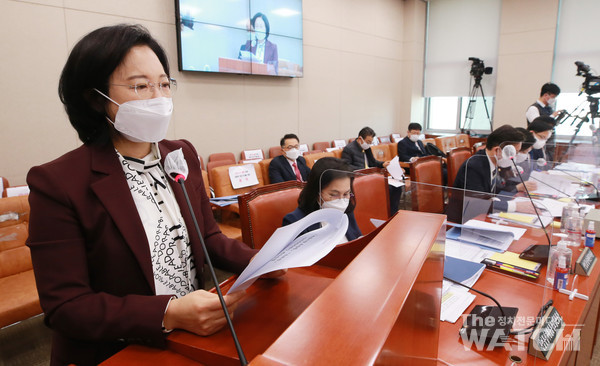Some of the most controversial bills recently proposed in South Korea’s National Assembly are related to so-called “media reform.” There are concerns that a set of bills the ruling Democratic Party (DP) is proposing would weaken the freedom of speech of domestic media outlets. One of the most recent media reform bills proposed by the DP is a newspaper reform bill.
It was proposed by Lee Soo-jin, a newly-elected lawmaker from the DP who previously served as a judge, and 12 lawmakers from the DP co-sponsored the bill. The bill, which was proposed on February 26, aims to mandate that newspaper companies establish an “editorial committee.” According to the bill, the committee must have editorial committee members who represent both company ownership and its reporters. It said that the purpose is to guarantee freedom in covering and editing news.
The bill will restrict newspaper companies from receiving government funding through the Korea Press Foundation if they fail to establish an editorial committee. According to the foundation, the Chosun Ilbo, DongA Ilbo, and JoongAng Ilbo were the top 3 newspapers that received the most funding from 2018 to 2020. Each company received around 2 billion won ($1.77 million). These three newspapers are the top three most-read newspapers in South Korea, and they are considered more conservative than other newspapers.
There was a similar bill proposed last year by another member of the DP, but it did not restrict newspapers from receiving funding just because they did not establish an editorial committee. Instead, the previous bill said it only aimed to prioritize newspapers that have committees when it comes to funding.
Lee’s new bill also will have the editorial committee recommend multiple people when its company appoints a new editor-in-chief. The purpose is to prevent the owner of a newspaper picking whomever they want to be the editor-in-chief on their own.
“We will try to create a media that do their utmost to keep objectivity and fairness, instead of them focusing on what the owner would think and how many clicks they get for their articles,” Lee said. “We will have the people’s tax money be spent on media that write stories objectively in straight language. We are not going to have our tax money go to greedy media conglomerates.”
The bill also includes a plan to regulate online news portals by having them release specific algorithms that decide how articles are displayed and ordered. It will also create an advisory committee with experts, media personnel, and civic groups to review how news is distributing online at least once a month.
The Korean Association of Newspapers and Korea News Editors’ Association released a joint statement on March 16 opposing the proposed bill. “The appointment of an editor-in-chief is related to freedom of the company and its own authority over human resources,” the statement read. “Legally regulating every newspaper’s appointment process would make room for government intervention in the process, and infringe upon editorial independence and freedom. The appointment of an editor-in-chief is something that a newspaper has freedom to choose by considering various factors, such as the company’s ideology, tradition, and mission.”
They said no developed country around the world mandates the establishment of an editorial committee by law. The statement added that only 8 countries out of 30 members of the Organization for Economic Cooperation and Development (OECD) have laws regulating newspapers’ operations. However, the purpose of these countries’ laws is to guarantee freedom of speech, instead of influence editorial independence. “Major developed countries such as the United States, United Kingdom, and Japan ban any law or the government’s involvement that would influence a newspaper company’s editing process,” the statement read.
The two organizations also criticized the bill as threatening companies over funding. “The newspaper business is worsening every year, and companies would be forced to follow the unjust regulation because of financial concerns,” the statement added. “This is an excessive regulation threatening companies with funding.” The statement argued that “editorial rights are not something that the law should get involved in and enforce.”
“Media reform” is one of the major agendas for the ruling DP, along with reforming the prosecution. Recently, they have proposed various bills that they claim would “reform” the media. Some of the plans include expanding punishment for the media “defamation” and expanding the number of members of the media watchdog organization. The DP has repeatedly shown its dissatisfaction with the media, and even blamed the loss of the recent Seoul mayoral by-election on the media.
“The media’s biased reporting has been an issue for quite some period of time, but it was too much during this election,” said Kim Jong-min, a lawmaker from the DP, on April 8, a day after the election. “The media did not investigate and cover stories on [the opposition party’s Seoul mayoral] candidate Oh Se-hoon’s real-estate issue thoroughly. If this trend continues until next year’s presidential election, it will surely be a significant threat to democracy.” Multiple senior members from the DP expressed similar concerns and argued that the media was one of the reasons that they lost the election.
However, a group of the DP’s young lawmakers, who are in their 20s and 30s, released a joint statement criticizing the party’s senior leadership. “We cannot agree with the argument that we lost this year’s by-elections due to the opposition party, media, public, and young generation,” the statement read. “There cannot be a situation in which the responsible political faction, who received a verdict from the people through votes, blames people and the media without examining the actual problems within itself.”


